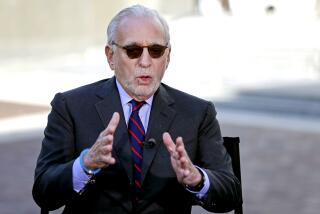Oak Industries : New Board Proposed in Proxy Fight
- Share via
Oak Industries director Roderick Hills, who last month initiated a proxy fight at San Diego-based Oak Industries, has proposed a new management slate that would be led at first by Dan Derbes, a former Allied-Signal executive.
Derbes would join Oak’s board as chairman of the executive committee and be responsible for the management of Oak until a new chief operating officer could be named, according to proxy materials sent Monday to Oak shareholders by Hills’ group.
The proxy materials, mailed in advance of Oak’s June 6 annual meeting, further defined the roles that Derbes and three other high-profile businessmen will hold if Hills’ proxy fight is successful.
Would Study Sale
Former U. S. Atty. Elliot L. Richardson would join Oak’s board and serve as chairman of the company’s audit committee.
San Diego Economic Development Corp. Chairman George Leisz, a former Aerojet executive, would join the board and lead a committee that would study a possible sale of Oak’s financially troubled communications division.
Gilbert Matthews, a senior managing director of Bear, Stearns & Co., a New York-based investment banking firm, would join the board and lead a committee that would “develop an acquisition strategy” for Oak, according to the Hills’ group’s proxy materials.
Oak spokeswoman Mary Lou Coburn on Monday declined to comment on the Hills group’s proxy. However, Oak’s proxy materials, which were mailed last week, advise shareholders to “not mail back any proxy cards that you may receive” from Hills’ Committee to Improve Shareholder Values of Oak Industries.
Oak’s stock has hovered at about $1 for more than a year, largely because the company that generated $300 million in net losses between 1981 and 1985 has yet to prove that it can sustain operating profits, according to Irving Katz, director of research for Thomas Green/San Diego Securities.
McNeeley Praised
The few industry analysts who follow the company credit Oak Chairman E. L. McNeely with improving the company’s performance since becoming chairman in November, 1984. However, Hills has maintained since initiating the proxy fight that McNeely and his staff lack the industrial operating experience needed to maintain an operating profit.
Hills, who was chairman of the U. S. Securities and Exchange Commission from 1975 to 1977, recently was appointed to Drexel Burnham Lambert’s board of directors. He also was recently named as head of the Washington office of Donovan Leisure Newton & Irvine, a New York-based law firm. His wife, Carla, is the Bush Administration’s U. S. trade representative.
Hills, an Oak board member since 1985, initiated the proxy fight in March after McNeely decided that Hills would not be included on Oak’s management slate of proposed board members.
Hills said Monday that he learned of McNeely’s proposed slate March 28, when the two men were in Detroit for a board meeting of Detroit-based Federal-Mogul Corp., where both men serve as board members. “I told (McNeely) that evening, before I went to bed, that I was going to start the proxy fight,” Hills said Monday.
In the 28-page proxy statement, Hills maintained that Oak will return to profitability only if control is turned over to “a management team with extensive industrial operating experience.” The new managers would improve the health of profitable operations and discontinue or sell off operations that cannot be run at a profit.
Hills has suggested that Oak give strong consideration to selling its communications division, which has not “reported an operating profit in the past four years.” The communications division accounts for about $30 million of Oak’s $145 million in total assets, and about $34 million of Oak’s $197 million in total sales during 1988.
“I doubt that Oak has the capital needed” to reposition the communications division as a profitable company, Hills said.
Seeking Friendly Party
The proxy materials mailed Monday also describe the need “to pursue a well-planned, focused and consistent acquisition strategy, taking full advantage of the financial resources” of Brittania Arrow Holdings, a British company that, through various subsidiaries, controls stock and warrants equal to 24.1% of Oak’s common stock.
Hills said he introduced principals from Brittania Arrow Holdings’ MIM Ltd. subsidiary to McNeely in early 1989, when Oak was seeking a friendly party to acquire a block of stock held by Santa Clara-based Itel.
MIM acquired its block of Oak stock with the intention of using Oak to make acquisitions in the United States, Hills said. “This is a great opportunity for Oak shareholders,” he said.
MIM was attracted to Oak in part because it holds $204 million in operating loss carry-forwards, which can be used to reduce taxes on income.
However, Hills’ proxy materials maintain that McNeely has failed to adopt a “coherent acquisition schedule” as requested by MIM’s two board representatives. The materials also allege that MIM’s board representatives have sided with Hills on several “significant business decisions.”
Hills is counting on MIM’s board representatives to vote their shares in favor of his slate. “Even if our proxy fight fails, Oak’s existing management will still have to face the fact that its major shareholder (MIM) is disenchanted,” he said.
In a related development Friday, McNeely said he has appointed several Oak directors to a committee that will “assess the present position of the company and its management structure, to review its strategic plans and to recommend changes that may be needed.”
The committee also will “commence a search, both inside and outside the company, for an Oak president, a position which currently is not occupied,” McNeely said.
More to Read
Inside the business of entertainment
The Wide Shot brings you news, analysis and insights on everything from streaming wars to production — and what it all means for the future.
You may occasionally receive promotional content from the Los Angeles Times.










